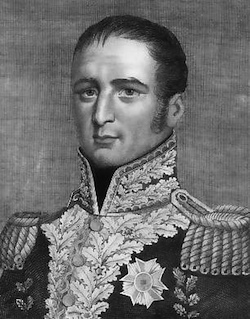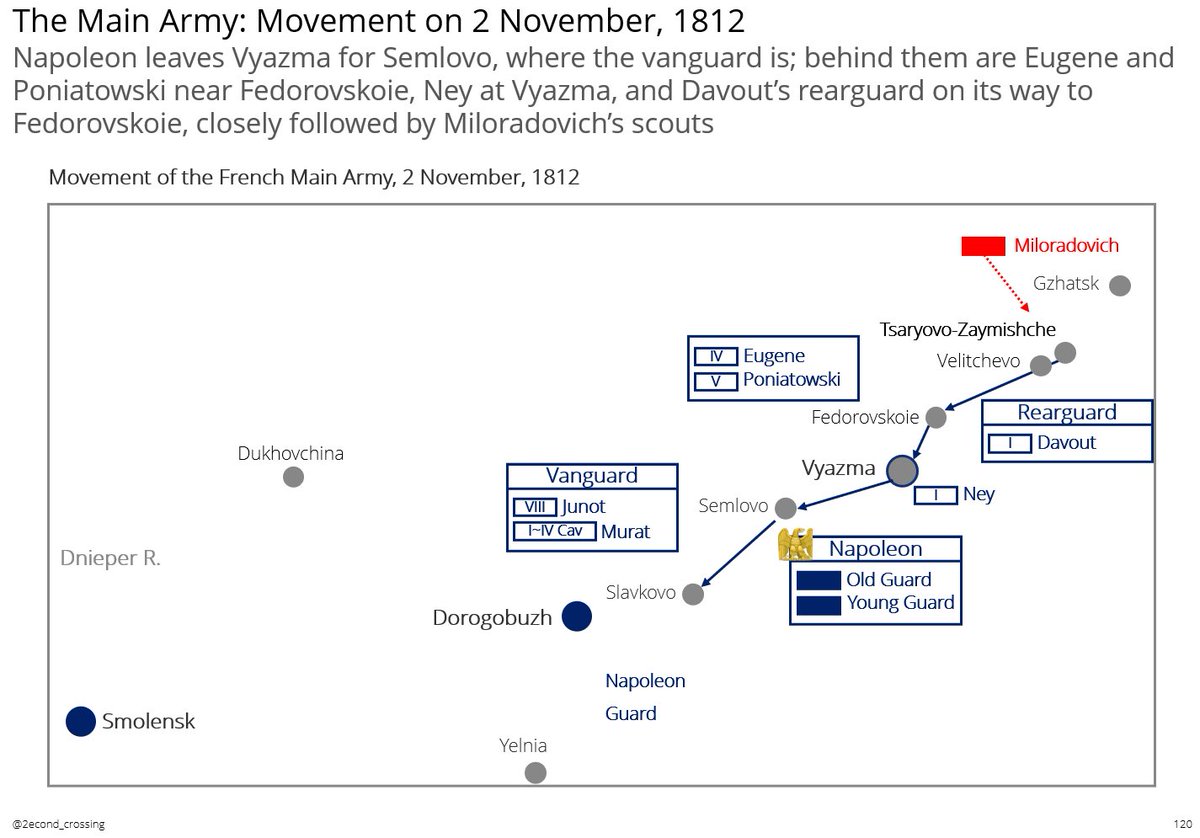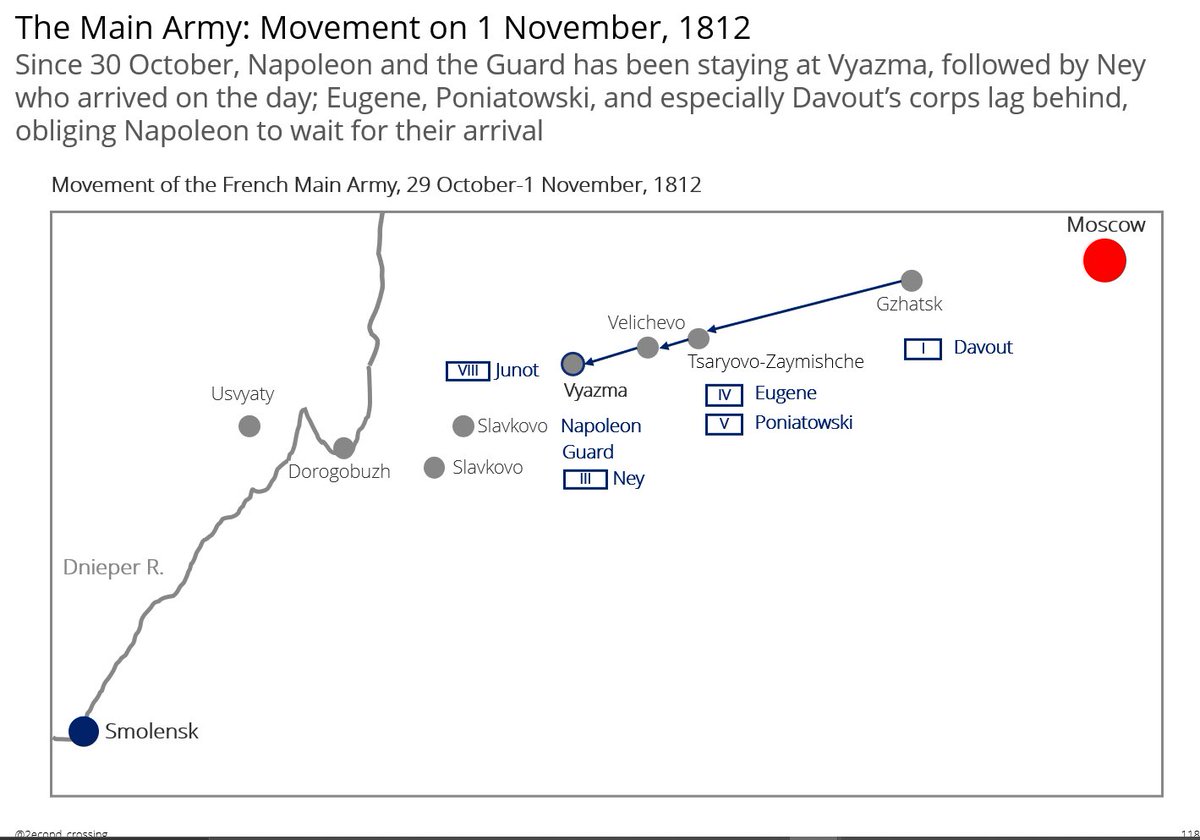
#OTD 3 November, 1812, Miloradovich attempted to cut off Davout's rearguard from the overstretched columns of the Grande Armée.
In the following Battle of Vyazma, the I Corps, for the first time in the Napoleonic Wars, were seen fleeing in panic.
#Voicesfrom1812
In the following Battle of Vyazma, the I Corps, for the first time in the Napoleonic Wars, were seen fleeing in panic.
#Voicesfrom1812

In the morning, Napoleon, the Guard, and Murat (I~IV Cavalry) started marching from Slavkoko to Dorogobuzh, where Junot's advanced guard (VIII) was.
Ney's (III) stayed in Vyazma, while Eugene (IV) and Poniatowski (V) were between Fedorovskoie and Vyazma.
(Riehn, Clausewitz)
Ney's (III) stayed in Vyazma, while Eugene (IV) and Poniatowski (V) were between Fedorovskoie and Vyazma.
(Riehn, Clausewitz)

Davout's I Corps, the rearguard, was 70 miles behind Eugene, nearing Fedorovskoie.
Miloradovich, having observed the still wide gap between the Davout and the advanced columns of the French, seized the moment when the former was alone on the road to Fedorovskoie.
Miloradovich, having observed the still wide gap between the Davout and the advanced columns of the French, seized the moment when the former was alone on the road to Fedorovskoie.

About 70 miles away from Eugene's corps, the French rearguard was trudging on the road to Vyazma.
At 8 o'clock in the morning, Miloradovich "formed à cheval upon the road" with General Korf's II Cavalry Corps and Major General Vassilchikov's IV Cavalry Corps.(Wilson, Foord)

At 8 o'clock in the morning, Miloradovich "formed à cheval upon the road" with General Korf's II Cavalry Corps and Major General Vassilchikov's IV Cavalry Corps.(Wilson, Foord)


Commanded by Vassilchikov, the Akhtyrka Hussars stormed the road between Gzhatsk and Fedorovskoie, taking General Gérard's advanced units by surprise. (Foord)
Miloradovich simultaneously "opened his guns, which he had established on his heights."
(Wilson)

Miloradovich simultaneously "opened his guns, which he had established on his heights."
(Wilson)


With the cannonade, the partisans under Platov, Figner, and Seslavin quickly infiltrated the French rear from the right side. Simultaneously, Paskevich's 26th Division and Choglokov's 11th Division began advancing from Fedorovskoie.
In total, the Russians were about 30,000 men.
In total, the Russians were about 30,000 men.

Eugene and Poniatowski's corps, on their way to Vyazma, were alerted by the din.
Leaving Pino's 15th Division and the Italian Guard at Vyazma to "cooperate with the corps of Ney in resisting the Russian army," Eugene led about 17,000 toward Fedorovskoie.
(Wilson, Labaume)
Leaving Pino's 15th Division and the Italian Guard at Vyazma to "cooperate with the corps of Ney in resisting the Russian army," Eugene led about 17,000 toward Fedorovskoie.
(Wilson, Labaume)

Attacked at both front and rear, Davout hurled up the rest of his army in support of Gérard. As he struggled to avoid being enveloped, Eugene's rearguard, General Nagel's brigade of the 13th Division, forced the passage across the swarms of Cossacks.
Upon his arrival, Eugene deployed his artillery on a high ground on the right side of the road, thwarting Vassilchikov's charges.
Ney, at Vyazma, "form[ed] a semi-circle around the town on the side toward Medyn" and built two bridges across the Vyazma River. (Fezensac, Foord)
Ney, at Vyazma, "form[ed] a semi-circle around the town on the side toward Medyn" and built two bridges across the Vyazma River. (Fezensac, Foord)

Those bridges, now defended by Ledru's 10th Division, ensured escape routes for the French. Another division of Ney, the 11th under Razout, was sent to aid Eugene and Davout.
Davout, now sufficiently reinforced, sent forth his tiralleurs and the artillery to repel the hussars.
Davout, now sufficiently reinforced, sent forth his tiralleurs and the artillery to repel the hussars.
In the absence of infantry support, Miloradovich's cavalry withdrew to join the Cossacks at the rear. Now, the Russians appeared to be cornered by Eugene, Poniatowski, and Davout.
Compans' I Division joined Nagel to contain the Russian advance on Vyazma. (Wilson)
Compans' I Division joined Nagel to contain the Russian advance on Vyazma. (Wilson)
However, the situation was again reversed at 10 a.m., when Duke Eugen arrived to reinforce the front of the left wing.
"Without pausing," his 4th Division "attacked the enemy ascending the heights" to deploy battery. (Wilson)
"Without pausing," his 4th Division "attacked the enemy ascending the heights" to deploy battery. (Wilson)

Paskevich and Choglokov, reaching Fedeorovskoie just in time, overtook Davout's left from the rear. Korf's cavalry was also set in motion to attack its head.
Once again, the enemy "threw themselves into the space which separated the fourth corps from the first," wrote Labaume.
Once again, the enemy "threw themselves into the space which separated the fourth corps from the first," wrote Labaume.

In consequence, the corps of Davout, Eugene, and Poniatowski were "exposed to an overwhelming fire from a strong body of artillery with horses better harnessed and in far better conditions than [theirs], which were too worn out for maneuvering." (Labaume) 

The counterattack, thus, expelled the French from the Vyazma-Fedorovskoie road.
This had a startling effect on the meticulously disciplined men of the Iron Marshal who, "[u]ntil then...had maintained its honor and reputation" even under artillary fire. (Caulaincourt)
This had a startling effect on the meticulously disciplined men of the Iron Marshal who, "[u]ntil then...had maintained its honor and reputation" even under artillary fire. (Caulaincourt)

But for the first time, at "[t]his momentary disorder," the infantry of the I Corps were seen breaking their ranks and fleeing everywhere. (Ibid)
The cavalry was even worse, for they, dismounted and "without arms," began running to and fro bewildered with fear." (Segur)
The cavalry was even worse, for they, dismounted and "without arms," began running to and fro bewildered with fear." (Segur)

Seeing Davout's men in disarray, Eugene swerved Guilleminot’s 13th Division and the V Corps to the right. By doing so, he tried to penetrate Eugen's left wing and reposition his armies north of the road to outflank the Russians.
(Riehn, Foord, Wilson)
(Riehn, Foord, Wilson)
Davout, too, endeavored to reinstill the morale of his troops.
He, along with the officers "still suffering from wounds received at [Borodino], one with his arm in a sling," led an orderly retreat toward the left side of the Vyazma Road. (Segur, Riehn)
He, along with the officers "still suffering from wounds received at [Borodino], one with his arm in a sling," led an orderly retreat toward the left side of the Vyazma Road. (Segur, Riehn)

Along the way, the I Corps vindicated its reputation by boldly seizing three cannons from the enemy center. But just as Davout fell back to the south, Eugene and Poniatowski came under a combined attack from Platov on their right and Vassilchikov and Korf on their left. (Foord) 

The 14th Division Broussier and the Italian Guard, kept as reserves up to this point, were mobilized. Combined with the 10th Division Razout of the III Corps and the V Corps, they strived to reestablish themselves on " the large redoubt upon the left" of the road. (Labaume)
According to Labaume, this final attempt at counterattack "began with much spirit." However, in face of the Russians' "great superiority of artillery" and the "wretched state of [the French] horses," Eugene saw that his position was becoming untenable. (Ibid, Wilson) 

Around 2 p.m., Eugene, Poniatowski, and Davout regrouped and held a council of war, where they decided in favor of a general withdrawal to the garrison of Vyazma. (Riehn)
At the same time, Wilson pleaded to Kutuzov to send reinforcements to deliver the final blow.
At the same time, Wilson pleaded to Kutuzov to send reinforcements to deliver the final blow.
Wilson insisted that "even a division of cavalry with some flying artillery must embarrass the enemy," to which Kutuzov only muttered, "The time was not yet come."
At 2 p.m., the Field Marshal reluctantly dispatched 3,000 Cossack cavalry under Uvarov. (Wilson)
At 2 p.m., the Field Marshal reluctantly dispatched 3,000 Cossack cavalry under Uvarov. (Wilson)

Supported by the rearguard action of Compans, Razout, and Nagle, Eugene and Poniatowski successfully withdrew to Vyazma and reunited with Ney.
At 4 p.m., when Uvarov finally approached the battlefield, he was checked by Ledru's division guarding the bridges.
At 4 p.m., when Uvarov finally approached the battlefield, he was checked by Ledru's division guarding the bridges.
The French, however, had clearly lost the battle. Despite being outnumbered by about three to two, their casualties of 4,000 were almost twice the Russians' 2,500.
One of the seriously wounded was Poniatowski, who fell from his horse and crushed his knee and shoulder.
One of the seriously wounded was Poniatowski, who fell from his horse and crushed his knee and shoulder.

The news of the incident reached Napoleon later on the day, when he reached Slavkovo.
That day, he was ordering Berthier to escort Wintzingerode, based on his claim that "he is not a subject of the Confederation [of the Rhine]," to Junot as "an ordinary prisoner." (Fain)
That day, he was ordering Berthier to escort Wintzingerode, based on his claim that "he is not a subject of the Confederation [of the Rhine]," to Junot as "an ordinary prisoner." (Fain)
Words spread that Miloradovich's army, for six hours, was "made to pay dearly for their daring attempt." (Caulaincourt)
But the attack, albeit inconclusive, was worth the cost.
But the attack, albeit inconclusive, was worth the cost.

Until the Battle of Maloyaroslavets, the French army had staunchly maintained its ground, emitting ferocity befitting of Napoleon's war machine.
Yet, on this day, their honor was compromised by "immense gaps in the ranks" and an utter lack of "order and unity." (Segur)
Yet, on this day, their honor was compromised by "immense gaps in the ranks" and an utter lack of "order and unity." (Segur)
In particular, the woeful spectacle of Davout's men-for the first time-breaking apart "encouraged the enemy." (Ibid)
It signalled that "the situation had completely changed" and that the French "were fighting for their skin and lives only for a secure flight." (Lowenstern)
It signalled that "the situation had completely changed" and that the French "were fighting for their skin and lives only for a secure flight." (Lowenstern)

@threadreaderapp Unroll!
• • •
Missing some Tweet in this thread? You can try to
force a refresh





















